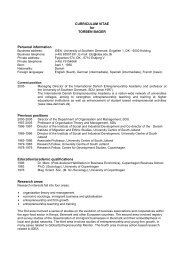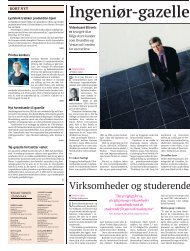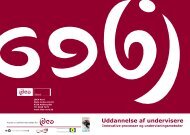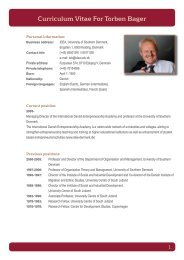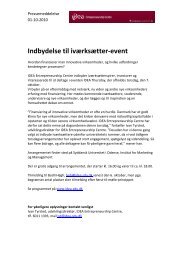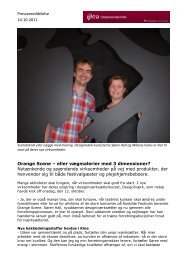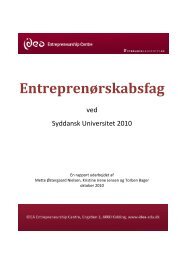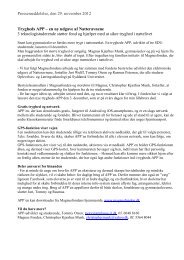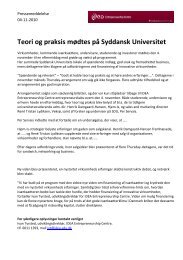Education, Training and Networking for Entrepreneurship in ...
Education, Training and Networking for Entrepreneurship in ...
Education, Training and Networking for Entrepreneurship in ...
You also want an ePaper? Increase the reach of your titles
YUMPU automatically turns print PDFs into web optimized ePapers that Google loves.
What are the national dynamics of entrepreneurship?<br />
More specifically, Chapter 5 addressed<br />
the questions, How are the cultural conditions<br />
affect<strong>in</strong>g one another? How are the <strong>in</strong>stitutional<br />
conditions <strong>in</strong>terrelated? How are the cultural<br />
<strong>and</strong> <strong>in</strong>stitutional conditions affect<strong>in</strong>g entrepreneurship?<br />
A culture of <strong>in</strong>dividualism <strong>in</strong> a typical developed<br />
society promotes the esteem of the entrepreneurial<br />
vocation, enhances the entrepreneurial<br />
education <strong>and</strong> <strong>in</strong>creases the entrepreneurial<br />
skills <strong>in</strong> the population. <strong>Education</strong> also has a<br />
dist<strong>in</strong>ct positive effect on the skills <strong>in</strong> the population.<br />
The basic <strong>in</strong>stitutional framework conditions<br />
create opportunities <strong>for</strong> the people to<br />
br<strong>in</strong>g their skills <strong>in</strong>to entrepreneurship. Opportunities<br />
coupled with skills jo<strong>in</strong>tly tend to promote<br />
the level of entrepreneurship <strong>in</strong> the developed<br />
society.<br />
This dynamic between framework conditions<br />
<strong>and</strong> level of entrepreneurship is illustrated by<br />
Denmark’s position. Denmark has a level of entrepreneurship<br />
that is about typical <strong>for</strong> the developed<br />
countries <strong>and</strong> a framework that is about<br />
typical. This is easily understood. When the<br />
country has a framework that is typical, then we<br />
also predict the result<strong>in</strong>g level of activity to be<br />
typical.<br />
The tight coupl<strong>in</strong>g between framework <strong>and</strong> per<strong>for</strong>mance<br />
is also exemplified by the USA. The<br />
USA has the best framework overall. This framework<br />
implies that the entrepreneurial per<strong>for</strong>mance<br />
<strong>in</strong> the USA is very high, <strong>in</strong>deed, the USlevel<br />
is among the highest among the developed<br />
societies.<br />
People <strong>in</strong>volved <strong>in</strong> entrepreneurship through<br />
education, tra<strong>in</strong><strong>in</strong>g, competency <strong>and</strong><br />
network<strong>in</strong>g<br />
How are people tra<strong>in</strong>ed <strong>for</strong> entrepreneurship <strong>in</strong><br />
Denmark <strong>and</strong> other societies More specifically,<br />
Chapter 6 addressed the problems, How much<br />
of the adult population is tra<strong>in</strong>ed? Have people<br />
been tra<strong>in</strong>ed ma<strong>in</strong>ly dur<strong>in</strong>g their school<strong>in</strong>g<br />
or later <strong>in</strong> life? What is the organizational context<br />
of later tra<strong>in</strong><strong>in</strong>g, <strong>and</strong> is this voluntary or<br />
compulsory? How is people’s tra<strong>in</strong><strong>in</strong>g affected<br />
by their gender, age <strong>and</strong> education? Is the tra<strong>in</strong><strong>in</strong>g<br />
exp<strong>and</strong><strong>in</strong>g <strong>in</strong> Denmark <strong>and</strong> <strong>in</strong> other societies?<br />
About 22% of the adults <strong>in</strong> Denmark have received<br />
tra<strong>in</strong><strong>in</strong>g <strong>in</strong> start<strong>in</strong>g a bus<strong>in</strong>ess, less frequently<br />
dur<strong>in</strong>g their school<strong>in</strong>g, <strong>and</strong> then is was<br />
typically compulsory rather than voluntary,<br />
more frequently later than their school<strong>in</strong>g. The<br />
later tra<strong>in</strong>ed people have received their tra<strong>in</strong><strong>in</strong>g,<br />
typically voluntarily, <strong>in</strong> a variety of organizational<br />
contexts, often dur<strong>in</strong>g further <strong>for</strong>mal<br />
education, <strong>and</strong> often <strong>in</strong><strong>for</strong>mally. People’s tra<strong>in</strong><strong>in</strong>g<br />
is affected by gender, age <strong>and</strong> education <strong>in</strong><br />
the ways that women are less frequently tra<strong>in</strong>ed<br />
than men, older adults far less frequently than<br />
young adults, <strong>and</strong> people with long higher education<br />
less frequently than others. That tra<strong>in</strong><strong>in</strong>g<br />
is more typical <strong>in</strong> the young generation than <strong>in</strong><br />
the older generation is <strong>in</strong>dicative of the current<br />
expansion of tra<strong>in</strong><strong>in</strong>g. The expansion <strong>in</strong> Denmark<br />
seems to be faster than the expansions <strong>in</strong><br />
most other developed societies.<br />
How are people learn<strong>in</strong>g entrepreneurship, not<br />
only through tra<strong>in</strong><strong>in</strong>g, but also through their education,<br />
competency <strong>and</strong> network<strong>in</strong>g? More specifically,<br />
Chapter 7 dealt with the issues, Are people<br />
<strong>in</strong> Denmark educated at high <strong>and</strong> diverse<br />
levels <strong>in</strong> the educational system? Are people<br />
typcially competent to start a bus<strong>in</strong>ess? Is<br />
people’s competency enhanced by their education<br />
<strong>and</strong> tra<strong>in</strong><strong>in</strong>g? Are people typically network<strong>in</strong>g<br />
with starters? Is people’s network<strong>in</strong>g promoted<br />
by their education, tra<strong>in</strong><strong>in</strong>g <strong>and</strong> competency?<br />
Many people <strong>in</strong> Denmark have a vocational education,<br />
but more have a short, medium or long<br />
further education,while fewer have neither vocational<br />
nor higher education. <strong>Education</strong> affects<br />
tra<strong>in</strong><strong>in</strong>g <strong>in</strong> the manner that people with long<br />
higher education are less likely than others to<br />
be tra<strong>in</strong>ed <strong>for</strong> entrepreneurship, as mentioned<br />
above. People’s education <strong>and</strong> tra<strong>in</strong><strong>in</strong>g have<br />
dist<strong>in</strong>ct effects upon their competency to start<br />
a bus<strong>in</strong>ess, <strong>in</strong> the ways that long higher education<br />
promotes competency, <strong>and</strong> tra<strong>in</strong><strong>in</strong>g also<br />
enhances competency. These have further dis-<br />
80




